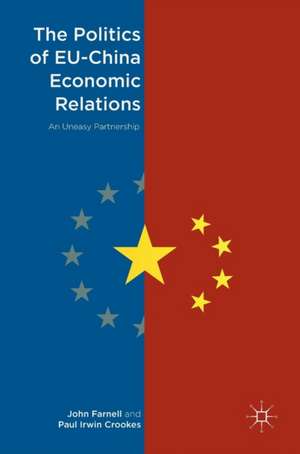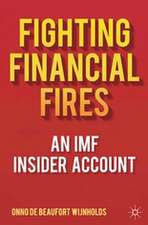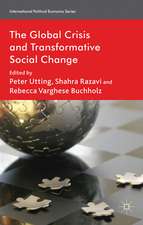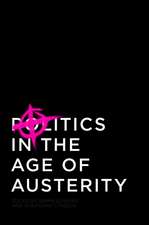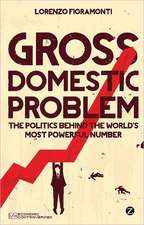The Politics of EU-China Economic Relations: An Uneasy Partnership
Autor John Farnell, Paul Irwin Crookesen Limba Engleză Hardback – 5 oct 2016
Preț: 641.38 lei
Preț vechi: 754.56 lei
-15% Nou
Puncte Express: 962
Preț estimativ în valută:
122.77€ • 133.40$ • 103.19£
122.77€ • 133.40$ • 103.19£
Carte tipărită la comandă
Livrare economică 21 aprilie-05 mai
Preluare comenzi: 021 569.72.76
Specificații
ISBN-13: 9781137491176
ISBN-10: 1137491175
Pagini: 334
Ilustrații: XXI, 244 p. 3 illus.
Dimensiuni: 148 x 210 x 20 mm
Greutate: 0.45 kg
Ediția:1st ed. 2016
Editura: Palgrave Macmillan UK
Colecția Palgrave Macmillan
Locul publicării:London, United Kingdom
ISBN-10: 1137491175
Pagini: 334
Ilustrații: XXI, 244 p. 3 illus.
Dimensiuni: 148 x 210 x 20 mm
Greutate: 0.45 kg
Ediția:1st ed. 2016
Editura: Palgrave Macmillan UK
Colecția Palgrave Macmillan
Locul publicării:London, United Kingdom
Cuprins
Acknowledgements.- List of Figures and Tables.- List of Abbreviations.- About the Authors.- Part 1: EU-China Relations in a Global Context.- 1. A new economic relationship in a changing world.- 2. The Development of the EU’s links with China’s Re-emerging and Reforming Economy.- 3. The EU and China in the Governance of Global Financial and Trading Systems.- Part II: Opportunities and Risks in the EU-China Relationship.- 4. Trade.- 5. Investment.- 6. Innovation and Research.- 7. Monetary affairs.- 8. Cooperation on common economic challenges.- Part III: The Importance of EU-China Economic Relations in the Coming Decade.- 9. The Elephant in the Room: the role of the United States in EU-China relations.- 10. Conclusion: Optimism or Pessimism about the Future of EU-China Economic Relations?.- Index.
Recenzii
“It offers a comprehensive and well-balanced account of economic relations across trade, investment, innovation, finance and global governance, with a particular focus on their politics. The volume also identifies scope for greater collaboration, in particular on global governance and monetary issues. … this is an excellent account of EU–China relations which should appeal to specialist and generalist readers alike.” (Tim Summers, International Affairs, Vol. 94, January, 2018)
Notă biografică
John Farnell is currently an Academic Visitor at St Antony’s College, University of Oxford, UK. He spent most of his career with the European Commission, retiring in 2012 as Director for International Affairs in DG Enterprise and Industry, where he managed the EU’s industrial policy dialogue with China. John was educated at the University of Cambridge and the London School of Economics and Political Science (LSE).
Paul Irwin Crookes is Lecturer in the International Relations of China and Director of Graduate Studies for the School of Interdisciplinary Area Studies at the University of Oxford, UK. He has research interests in EU-China relations, China’s innovation capabilities, and the evolution of global governance. Paul gained his master’s and PhD degrees from the University of Cambridge and holds a BSc(Economics) from the LSE.
Paul Irwin Crookes is Lecturer in the International Relations of China and Director of Graduate Studies for the School of Interdisciplinary Area Studies at the University of Oxford, UK. He has research interests in EU-China relations, China’s innovation capabilities, and the evolution of global governance. Paul gained his master’s and PhD degrees from the University of Cambridge and holds a BSc(Economics) from the LSE.
Textul de pe ultima copertă
This book examines the political factors in the economic relationship between the European Union and China that help to explain the apparent stalling of the EU-China strategic partnership in policy terms. Written by two specialists with long experience of EU-China relations, this new volume draws on the latest research on how each side has emerged from the economic crisis and argues that promising potential for EU-China cooperation is being repeatedly undermined by political obstacles on both sides. The work is designed to be an analysis useful for university faculty and students interested in China and the European Union as well as for the general reader, providing an empirically-led examination that is academically informed and yet also approachable. Dissecting key policy areas such as trade, research and innovation, investment, and monetary affairs, the conclusion offers a compelling prognosis of how the EU-China relationship might develop over the coming years.
